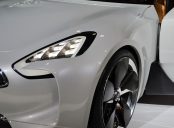VW Hybrid: A Revolution in Automotive Technology

Introduction:
VW Hybrid, also known as Volkswagen Hybrid, is a remarkable advancement in automotive technology that combines the efficiency of electric motors with the power of internal combustion engines. This article delves into everything you need to know about VW Hybrid, providing a comprehensive overview for individuals interested in this subject. From its inception to its current state, we will explore the historical development of VW Hybrid, emphasizing its significance in the automotive industry.
What is VW Hybrid?

VW Hybrid refers to Volkswagen vehicles that incorporate both an internal combustion engine and an electric motor. These cars are designed to operate using either individual power sources or a combination of both, based on the driving conditions. This hybrid technology aims to optimize fuel efficiency while reducing emissions, making VW Hybrid an attractive option for eco-conscious consumers.
How VW Hybrid Works:
VW Hybrid vehicles utilize a combination of an internal combustion engine and one or more electric motors. The electric motor acts as a supplementary power source, providing assistance to the conventional engine when necessary. During low-speed driving or when the battery is sufficiently charged, the vehicle can operate solely on electric power, resulting in zero emissions. However, when higher speeds or greater power demand is required, the internal combustion engine seamlessly kicks in to ensure optimal performance. This seamless transition between power sources is one of the main advantages of VW Hybrid technology.
Historical Development of VW Hybrid:
VW Hybrid has come a long way since its inception, with continuous innovation and improvements. Let’s take a closer look at the key milestones in the historical development of VW Hybrid:
1. Introduction of the First VW Hybrid Concept:
In the early 2000s, Volkswagen presented their first hybrid concept, showcasing their commitment to sustainable mobility. This concept vehicle incorporated an electric motor alongside a traditional gasoline engine, providing a glimpse into the future of automotive technology.
2. Launch of VW Hybrid Production Models:
Volkswagen introduced its first hybrid production models, such as the Volkswagen Golf GTE and Volkswagen Passat GTE, in the mid-2010s. These vehicles offered impressive fuel efficiency, reduced emissions, and a seamless driving experience. VW Hybrid technology quickly gained popularity among environmentally conscious consumers.
3. Advancements in Battery Technology:
Over the years, Volkswagen has made significant advancements in battery technology, enhancing the performance and range of their hybrid vehicles. By utilizing advanced lithium-ion batteries and continuously optimizing their design, VW Hybrid models offer increased electric driving range and improved energy storage capabilities.
4. Integration of Plug-In Hybrid Technology:
Volkswagen has incorporated plug-in hybrid technology into their VW Hybrid lineup, allowing drivers to charge their vehicles externally from an electrical outlet. This integration is a major milestone, as it provides an even greater opportunity for zero-emission driving, especially for shorter daily commutes.
How VW Hybrid Benefits Consumers:
VW Hybrid vehicles offer several benefits to consumers, making them an appealing choice for both eco-conscious individuals and automotive enthusiasts:
1. Fuel Efficiency:
By combining the power of electric motors with the efficiency of internal combustion engines, VW Hybrid vehicles deliver exceptional fuel efficiency. This not only helps reduce the overall carbon footprint but also saves drivers money on fuel costs.
2. Lower Emissions:
The incorporation of electric motors in VW Hybrid cars significantly reduces emissions compared to traditional internal combustion engines. This makes them an environmentally friendly option, contributing to a cleaner and healthier environment.
3. Seamless Driving Experience:
VW Hybrid technology ensures a seamless transition between power sources, providing a smooth and enjoyable driving experience. The combination of electric power at lower speeds and the combustion engine at higher speeds ensures optimal performance without sacrificing power.
Conclusion:
VW Hybrid technology has revolutionized the automotive industry, offering a sustainable and efficient alternative to traditional internal combustion engines. From its early concept stages to the launch of production models, Volkswagen has continually improved and refined its hybrid offerings. With benefits such as improved fuel efficiency, reduced emissions, and a seamless driving experience, VW Hybrid vehicles appeal to a diverse range of car owners and enthusiasts. As the automotive industry continues to prioritize sustainability, VW Hybrid is bound to play a significant role in shaping the future of transportation.





















